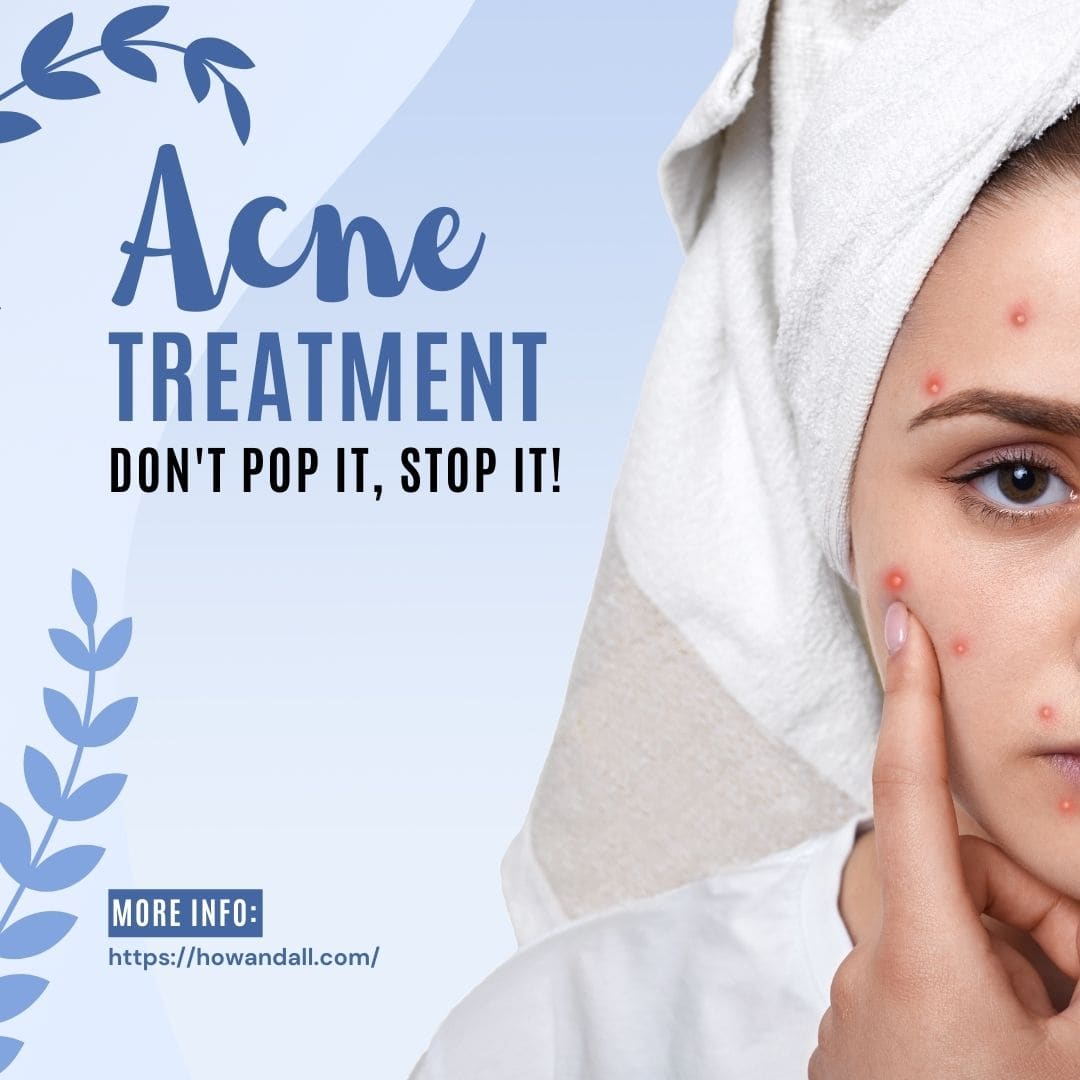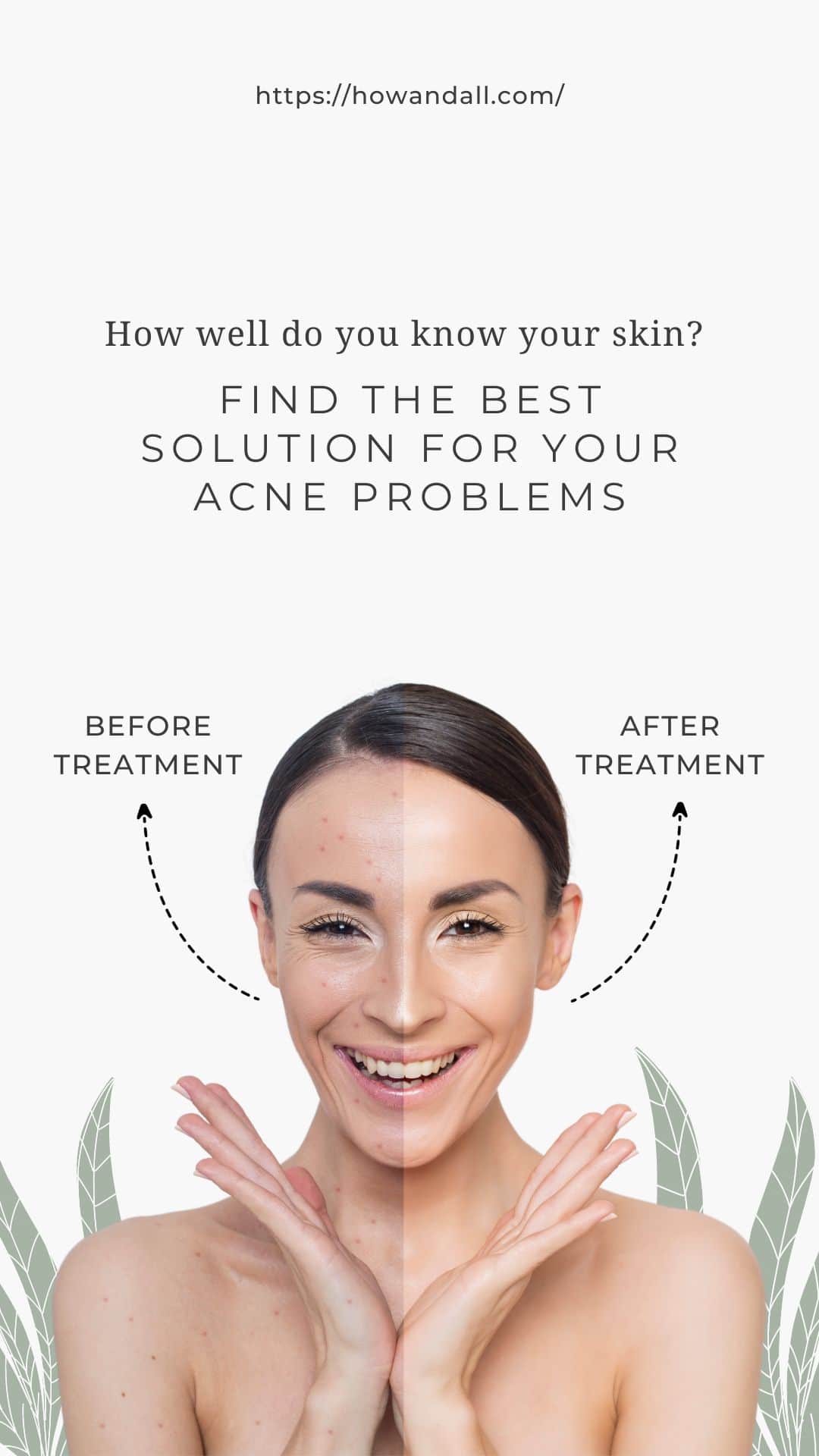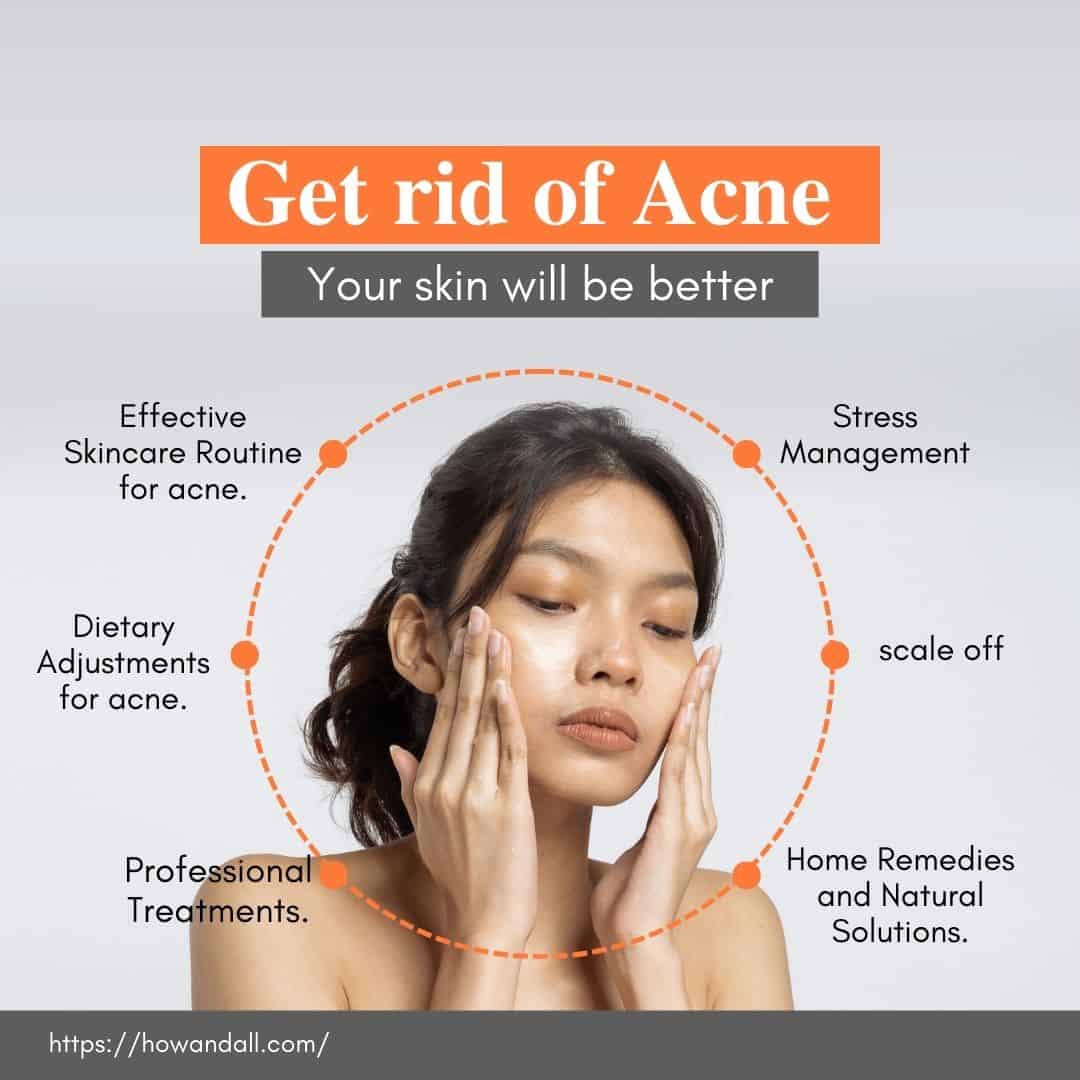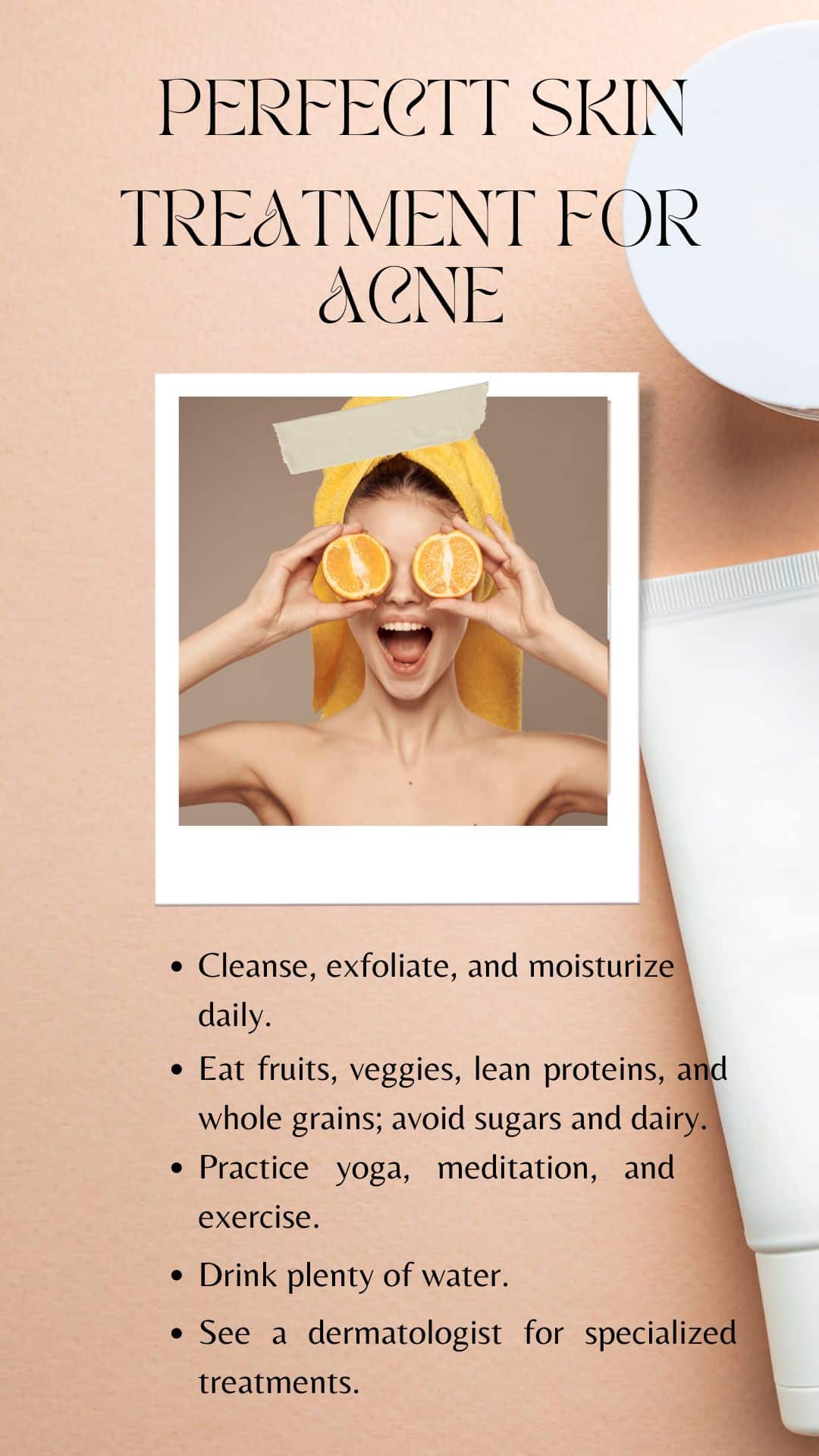
How to get rid of Acne.
-
by admin
- 0
Are you tired of waking up to unexpected breakouts? Acne, a common skin condition, affects millions of people worldwide, often causing frustration and self-consciousness. Whether you’re a teenager battling hormonal changes or an adult dealing with stress-induced pimples, pimples can be a persistent and unwelcome visitor. This article delves into effective strategies and practical tips to help you get rid of acne, so you can enjoy clearer, healthier skin.

Understanding Acne
Acne, a skin condition characterized by pimples, blackheads, and cysts, can affect individuals of all ages. It primarily occurs when hair follicles become clogged with oil and dead skin cells. Understanding the underlying causes of acne is crucial to effectively combating it. Hormonal changes, particularly during puberty, are a significant factor. Additionally, stress, diet, and improper skincare routines can exacerbate the condition. By identifying these triggers, you can tailor your approach to achieve clearer skin.
Hormonal changes are one of the primary causes of acne, especially during adolescence. During puberty, the body undergoes various hormonal fluctuations, leading to increased oil production in the skinSebum, usually excess oil, can block pores and foster the growth of germs that cause pimples. Hormonal acne isn’t limited to teenagers; adults can experience it too, particularly women who may notice breakouts tied to their menstrual cycles, pregnancy, or menopause.
Another factor contributing to pimples is stress. When you’re stressed, your body produces more cortisol, a hormone that can increase oil production and trigger breakouts. Managing stress is essential for maintaining clear skin, as chronic stress can exacerbate existing acne and even lead to new breakouts.

Effective Skincare Routine for acne.
One of the most effective ways to get rid of acne is by establishing a consistent skincare routine. Cleansing, exfoliating, and moisturizing are the three pillars of a good skincare regimen. At first, apply a mild cleanser appropriate for your skin type to get rid of debris, oil, and makeup. Look for cleansers with ingredients like salicylic acid or benzoyl peroxide, which can help reduce pimples by unclogging pores and reducing inflammation.
Exfoliation, done 2-3 times a week, helps remove dead skin cells that can clog pores. However, it’s important to choose an exfoliator that is not too harsh, as overly abrasive products can irritate the skin and worsen pimples. Chemical exfoliants containing alpha hydroxy acids (AHAs) or beta hydroxy acids (BHAs) are effective options that can gently remove dead skin cells without causing irritation.
After cleansing and exfoliating, moisturizing is crucial to keep your skin hydrated. Opt for non-comedogenic moisturizers that won’t clog pores. Even oily skin needs hydration, as dehydrated skin can produce more oil to compensate, leading to more breakouts. Look for moisturizers containing ingredients like hyaluronic acid or glycerin, which can provide hydration without adding excess oil.
Incorporating targeted treatments into your skincare routine can also help manage acne. Products containing ingredients like niacinamide, sulfur, or tea tree oil can be effective in reducing inflammation and preventing breakouts. Consistency is key when it comes to skincare; following your routine diligently can lead to significant improvements in your skin’s appearance over time.
Dietary Adjustments for acne.
Your skin condition is greatly influenced by the foods you eat. Consuming a balanced diet rich in fruits, vegetables, lean proteins, and whole grains can help manage acne. Foods high in refined sugars and dairy have been linked to increased pimples flare-ups. Incorporating antioxidants such as vitamins A, C, and E can promote skin health and reduce inflammation. Additionally, staying hydrated by drinking plenty of water helps flush out toxins from your body, contributing to clearer skin. Making mindful dietary choices can serve as an effective strategy to get rid of acne.
Certain foods have been shown to exacerbate acne, particularly those with a high glycemic index. These foods, which include sugary snacks, white bread, and sodas, can cause spikes in blood sugar levels, leading to increased oil production and inflammation. Reducing your intake of high-glycemic foods and opting for complex carbohydrates like whole grains, fruits, and vegetables can help stabilize blood sugar levels and reduce pimples flare-ups.
Dairy products, particularly milk, have also been linked to acne. Some studies suggest that hormones present in milk can trigger acne breakouts, especially in individuals who are sensitive to these hormones. If you suspect that dairy is contributing to your pimples, try reducing your intake or switching to dairy alternatives like almond milk or oat milk.
Including foods high in omega-3 fatty acids, including walnuts, salmon, and flaxseeds, can help improve your skin. Omega-3s have anti-inflammatory properties that can help reduce the severity of acne. Additionally, consuming a diet high in antioxidants can protect your skin from oxidative stress and promote healing. Foods like berries, leafy greens, and nuts are excellent sources of antioxidants that can support your skin health.
Stress Management.
Stress is a significant contributor to acne. When you’re stressed, your body produces more cortisol, a hormone that can lead to increased oil production and, subsequently, pimples. Incorporating stress management techniques into your daily routine can help alleviate this issue. Practices such as yoga, meditation, and deep breathing exercises can reduce stress levels. Regular physical activity, whether it’s jogging, cycling, or even a brisk walk, can also help manage stress. By addressing the emotional aspect of acne, you can achieve a clearer complexion and a more balanced life.
Finding healthy ways to manage stress is essential for maintaining clear skin. Mindfulness practices, such as meditation and deep breathing exercises, can help you stay present and reduce anxiety. Setting aside time each day to engage in these practices can significantly lower your stress levels and improve your overall well-being.
Physical activity is another effective way to manage stressEndorphins are natural mood enhancers that are released during exercise and have the potential to lower stress. Whether you prefer high-intensity workouts or more gentle activities like yoga or tai chi, incorporating regular physical activity into your routine can help keep stress levels in check and improve your skin health.
In addition to mindfulness and exercise, ensuring you get enough sleep is crucial for managing stress and maintaining clear skin. Lack of sleep can increase cortisol levels and contribute to acne breakouts.Try getting 7–9 hours of good sleep every night to ensure your body gets the rest it requires for optimum performance.

Professional Treatments.
For persistent acne that doesn’t respond to over-the-counter treatments, seeking professional help may be necessary. Dermatologists can provide various treatments to effectively get rid of acne. Prescription medications, such as topical retinoids or oral antibiotics, can target severe cases. In-office procedures like chemical peels, laser therapy, and microdermabrasion can also be effective. These treatments not only address existing acne but also help prevent future breakouts. Consulting a dermatologist ensures you receive personalized care tailored to your specific skin needs.
Topical retinoids are a common prescription treatment for acne. These vitamin A derivatives have the ability to decrease inflammation, encourage cell turnover, and clear pores. They are particularly effective for treating comedonal acne, which is characterized by blackheads and whiteheads.
Oral antibiotics may be prescribed for more severe cases of acne, especially when there is significant inflammation. Antibiotics can reduce the bacteria that cause pimples and decrease inflammation, leading to clearer skin. However, they are typically used for short periods to prevent antibiotic resistance.
In-office procedures can also provide significant improvements for individuals with stubborn acne. Chemical peels involve applying a chemical solution to the skin to exfoliate the top layers, promoting the growth of new, healthier skin. Laser therapy and light treatments can target the bacteria that cause acne and reduce oil production. Microdermabrasion is another option that involves exfoliating the skin with a special device to remove dead skin cells and unclog pores.
also read “Top Fashion Brand of The World”
Home Remedies and Natural Solutions.
In addition to conventional treatments, several home remedies and natural solutions can help you get rid of acne. Tea tree oil, known for its antibacterial properties, can be applied topically to reduce inflammation. Honey, with its antimicrobial properties, can be used as a face mask to soothe and heal the skin. Aloe vera is another excellent natural remedy that can calm irritated skin and promote healing. These home remedies offer a gentle alternative to harsh chemicals, making them suitable for sensitive skin types.
Tea tree oil is a popular natural remedy for acne due to its antimicrobial and anti-inflammatory properties. When diluted with a carrier oil, such as coconut oil or jojoba oil, it can be applied directly to pimples to reduce redness and swelling. It’s important to use tea tree oil sparingly, as it can be potent and cause irritation if used in excess.
Honey, particularly raw or Manuka honey, can be used as a natural face mask to treat acne. Honey has antibacterial properties that can help reduce acne-causing bacteria and promote healing. Applying a thin layer of honey to your face and leaving it on for 10-15 minutes before rinsing off can help soothe and hydrate your skin.
Aloe vera is another versatile natural remedy that can benefit acne-prone skin. Aloe vera gel, extracted from the leaves of the aloe plant, has anti-inflammatory and healing properties. Applying aloe vera gel to the skin can help reduce redness and irritation associated with acne and promote faster healing of blemishes.
Other natural remedies for acne include apple cider vinegar, which can be used as a toner to balance the skin’s pH and reduce bacteria, and green tea, which can be applied topically or consumed to reduce inflammation and oxidative stress. Exploring these natural options can provide gentle and effective solutions for managing acne.

Conclusion
Acne can be a challenging condition to manage, but with the right strategies and consistent effort, it is possible to achieve clearer skin. Understanding the causes of acne, maintaining an effective skincare routine, making dietary adjustments, managing stress, seeking professional treatments, and exploring natural remedies are all essential steps in this journey. By implementing these tips, you can take control of your skin health and enjoy the confidence that comes with a clear complexion. Remember, the key to getting rid of acne is persistence and patience—your skin will thank you for it.
In conclusion, taking a holistic approach to acne treatment by addressing both internal and external factors is the most effective way to achieve lasting results. Whether you choose to follow a strict skincare routine, make lifestyle changes, or seek professional advice, consistency is crucial. Start your journey to clearer skin today, and embrace the confidence that comes with a healthy, radiant complexion. With dedication and the right approach, you can successfully get rid of acne and enjoy the clear skin you deserve.
Share with your communityAre you tired of waking up to unexpected breakouts? Acne, a common skin condition, affects millions of people worldwide, often causing frustration and self-consciousness. Whether you’re a teenager battling hormonal changes or an adult dealing with stress-induced pimples, pimples can be a persistent and unwelcome visitor. This article delves into effective strategies…
Share with your communityAre you tired of waking up to unexpected breakouts? Acne, a common skin condition, affects millions of people worldwide, often causing frustration and self-consciousness. Whether you’re a teenager battling hormonal changes or an adult dealing with stress-induced pimples, pimples can be a persistent and unwelcome visitor. This article delves into effective strategies…